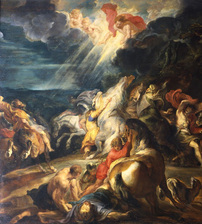
Jewish Rabbis and ascetic Essene movements had been studying the Prophets to figure out everything God was about to do. Jewish documents produced from 1st Century theologians, like 2 Baruch, 4 Ezra, Enoch, and the Dead Sea Scrolls, talked about what would take place. God was about to step into history to redeem. He was about to put an end to an age of oppression and corruption. He was about to introduce a new age. But what signs would tell people the new age had begun?
In Jesus' day, Isaiah 25:8 & 26:19, Daniel 12:2, and Ezekiel 37 had been used to paint "resurrection from the dead" into the portrait of God's next great act in history. The dead bones becoming living flesh again in Ezekiel 37 was originally a metaphor about Jews returning from exile in Babylon. But freedom from the specific oppression of the foreign power, Babylon, had turned into a general hope of freedom from all oppression.
The Babylonian exile was God's punishment for sin in Ezekiel's time. In Jesus' day Jews were looking for redemption from new consequences of their sin (read 4 Ezra as the written theology at the end of the 1st Century for what was verbally taking shape in Jesus' time). Jews began to expect a new freedom from their oppression by the Romans that would come alongside a literal resurrection from the dead.
Resurrection was not the only sign that God was stepping in to redeem. The Apocalypse of Baruch and Dead Sea Scrolls like the Messianic Apocalypse (4Q521) predicted a "feast of the Messiah" where the manna miracle will be performed again. Jesus reenacted that miracle in the feeding of the 5,000 (read chapter 4 of Reenacting the Way). The Messianic Apocalypse also combines resurrection with other miracles predicted in Isaiah 35:5, such as the blind seeing again and the wounded being healed. Luke 7:20-22 (and parallel in Matthew 11:4-5) make the same combination. The very act of combining miracles predicted in Isaiah into a single portrait for God's next great act of redemption through the Messiah shows you how the Old Testament prophecies above were being interpreted. Resurrection was one sign among many that God's promised salvation of his people was finally happening.
The NT book of Hebrews and the Jewish book 4 Ezra call these great events "the consummation of the ages." The world as God's people had known it was coming to an end. A new world that had been promised was starting.

Do you remember what experience changed Saul the persecutor of Jesus' followers into Paul the apostle of Jesus the Messiah? It was one vision he had on the road to Damascus. He saw Jesus raised from the dead. That changed everything.
Paul had studied the Jewish prophecies above and interpreted them similarly to Jewish teachers at Qumran and those behind 4 Ezra and the Apocalypse of Baruch. He believed that resurrection inaugurated a whole new age where God would reign over his people in a new way.
When he saw that Jesus had been raised from the dead, it triggered a huge series of conclusions about what God had done. Easter morning, Jesus' resurrection from the dead and exaltation to heaven, meant God had stepped in to redeem his people. All of the hopes, like one day God "will give you a new heart and put a new spirit within you" (Ezekiel 36:26), were actually becoming reality. Paul spent the rest of his life explaining how it worked. That's what he called "the Gospel."
Jesus' resurrection isn't just about celebrating the first human's victory over death. It isn't just a statement that life can last beyond the grave. Jesus' resurrection signaled a change of the ages. People could now experience and relate to God in a whole new way.
The entire book of Hebrews celebrates this change of the ages. Since Jesus had inaugurated a new way of relating to God, the old way of worshiping at the Temple in Jerusalem became obsolete. The priests, the altar, and the sacrifices were part of an Old Covenant system on its way out. You could now "approach God's throne of grace with confidence" (Hebrews 4:16) through the risen Jesus in heaven. As Hebrews 8:13 makes clear, the New Covenant "has made the old covenant obsolete." You didn't need to go back and look for God at the Temple's location.
However, the New Testament never fully celebrates the transition to the new age. The reason is: what began with Jesus' resurrection was not finished until the destruction of Jerusalem's Temple. That is why the writer of Hebrews has to talk about the impending doom of the Old Covenant, "what is becoming obsolete and growing old is ready to disappear" (Hebrews 8:13).
Jesus' resurrection had signaled that everything would be different, but that "change of the ages" took about 40 years from the resurrection to be finalized in 70AD. Jesus' own prophecy on the Mount of Olives (in Matthew 24; Mark 13; Luke 21) focused on that final judgment of Jerusalem, its corrupt religious leadership, and the Temple symbolizing the Old Covenant. The transition from the Old to the New that he would start by his death and resurrection would not be finished until the Old Covenant's material expression in Jerusalem came to an end.
The entire New Testament speaks about living in the tension between the two ages. Many theologians have mistakenly thought we continue to live in the "already but not yet" of God's kingdom because they missed that the New Testament expected the imminent end of the transitional age (thanks for popularizing that mistake, GE Ladd!). Whether you read Hebrews 8, 1 Thessalonians 2, or John's Apocalypse, they all knew what began with Jesus' death and resurrection would be finalized in the destruction of Jerusalem's Temple (see chart below for a visual depiction of the New Testament period's "Change of the Ages").
God reigns among us in a way people never experienced before the Resurrection. From the inside out we can find freedom from oppression and the consequences of sin. We can resurrect from a sub-standard life limited by our rebellion against the God who knows best. The old system geo-located in Jerusalem with ongoing appeasement required is gone. God is now everywhere ready to inhabit and direct everyone. That is a change worth celebrating in Jesus' resurrection.








 RSS Feed
RSS Feed
